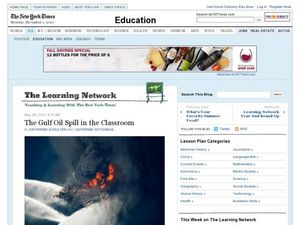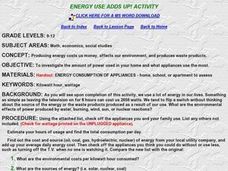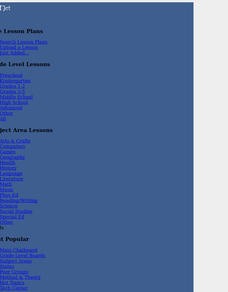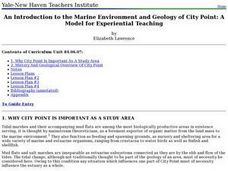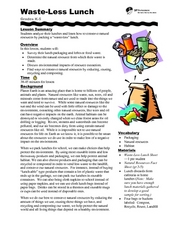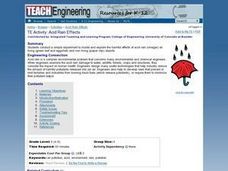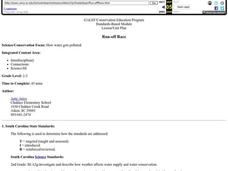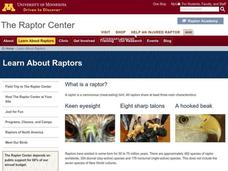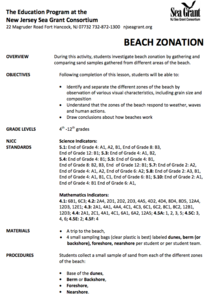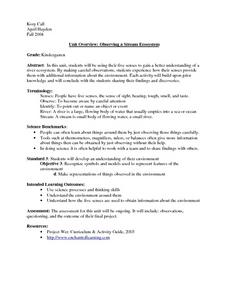Curated OER
Pelicans in Peril
In this Gulf oil spill instructional activity, students examine an article regarding the brown pelican and the effects of the oil spill as well as a photograph.
Curated OER
Gulf Oil Spill Fill-In
In this Gulf oil spill instructional activity, students examine an article regarding basic facts about the April 20, 2010 oil spill and then respond to 25 fill in the blank questions. A word bank is provided.
Curated OER
The Gulf Oil Spill in the Classroom
Students explore the concept of environmental stewardship. In this interdisciplinary lesson, students investigate the media response to the Gulf oil spill as they examine live streaming video, interpret data, and share their personal...
Curated OER
ENERGY USE ADDS UP!
High schoolers investigate the amount of power used in your home and what appliances use the most. They analyze the concept that producing energy costs us money, affects our environment and produces waste products. Students come up with...
Curated OER
Environment: Methane Sources
Students discover how human activity is increasing the release of methane gas into the atmosphere. Woring in groups, they visit the Eduzone Website and complete worksheets. Students identify the natural and human causes of methane gas.
Curated OER
Pollution
First graders identify and discuss different kinds and sources of of pollution. They explain why it is important to keep the environment free of pollution. They make a poster depicting the dangers of pollution and make litter boxes.
Curated OER
Organic and Inorganic Recycling
Students examine their role in polluting the environment and discuss the importance of recycling. In groups, they place earthworms into compost piles to observe why they are considered natural recyclers. They also practice sorting a...
Curated OER
An Introduction to the Marine Environment and Geology of City Point: A Model for Experiential Teaching
Young scholars begin the lesson by researching the history of City Point, Connecticut. Using a map, they color areas they were asked to find and discuss why the areas are important to the community. As a class, they are shown recent...
SF Environment
Waste-Less Lunch
Is it possible to have a waste-less lunch? Can your class become leaders in conservation? Discuss the importance of reducing waste during lunch time with a fun instructional activity that can be extended to everyday practices. First the...
K12 Reader
Taking Care of Earth
Provide a brief introduction to ecology and conservation with a reading passage. Learners can read the text, answer the five related questions that are included on the page, and discuss the reading.
Texas Commission on Environmental Quality
Environmental Sciences
Whether you are teaching environmental science in junior high or studying recycling in kindergarten, there is something for all in this set of lessons designed for environmental education. The 110-page packet comes with tips for...
Learning Games Lab
Nitrogen in Pollutants
Responsible farming is important for maintaining natural resources. Eager scientists complete a WebQuest to explore what happens to nitrogen when it enters the soil. They learn about the chemical makeup of nitrogen-based molecules...
Curated OER
Acid Rain Effects
Get out the goggles and conduct a simple experiment to model and explore the harmful effects of acid rain (vinegar) on living (green leaf and eggshell) and non-living (paper clip) objects. Young chemists observe and describe the harmful...
Curated OER
Fueling Extreme Weather
First graders identify the different stages in the hydrologic cycle. To study earth science, they investigate how sunlight affects the earth's temperature. They also discuss how the sun's energy is transformed.
Curated OER
Run-off Race
Students create wetland models in pans and use them to experiment to see how plants help slow the flow of runoff water and keep our waterways clean.
Curated OER
River Study
Students study physical features of a local stream. They study how to identify water features on topographic maps.
Curated OER
Jupiter - King of the Planets
In this Jupiter worksheet, students read a passage about the environment and atmosphere of Jupiter. Students then answer several multiple choice questions about the passage.
Curated OER
Nutrition: It's In Your Hands
Fourth graders use this lesson to focus on their health, nutrition and the state of the environment. In groups, they examine the various types of land, water and air pollutants and compare and contrast a food chain with and without a...
Michigan Sea Grant
Wetlands
Wetlands may not sound particularly ornate, but they are as important as any habitat! With a hands-on activity, young scientists build a wetland model and observe its many functions in action. They discover the importance of wetlands to...
Curated OER
Themes to Encourage Awareness of Environmental Changes on the Shoreline of Connecticut in Elementary School Students: The Case of Kelsey Island
Students begin the activity by developing a map of Kelsey Island by following specific instructions. In groups, they are given a block of ice in which they tie a rope around and drag over various rocks for different distances. They...
Curated OER
Beach Zonation
Young scholars investigate the characteristics of the beach environment and explore beach zonation. After gathering samples from different areas of the beach, young scholars discuss how the beaches work and the characteristic of each...
Curated OER
Journey of Discovery and Rivers
Learners investigate the rivers encountered and mapped by the Corps of Discovery. They analyze maps, outline and label rivers on a blank map, complete a chart, and answer discussion questions while watching a National Geographic video,...
Curated OER
Cloud in a bag
Students relate the states of matter and clouds. In this environment lesson, students create a chart of information they know about clouds. Students put an ice cube in a bag and tape to a window. Students watch for...
Curated OER
Observing a Stream Ecosystem
Students use their five senses to explore a river ecosystem. They experience how their senses provide them with additional information about the environment through the use of teacher made stream boxes.


